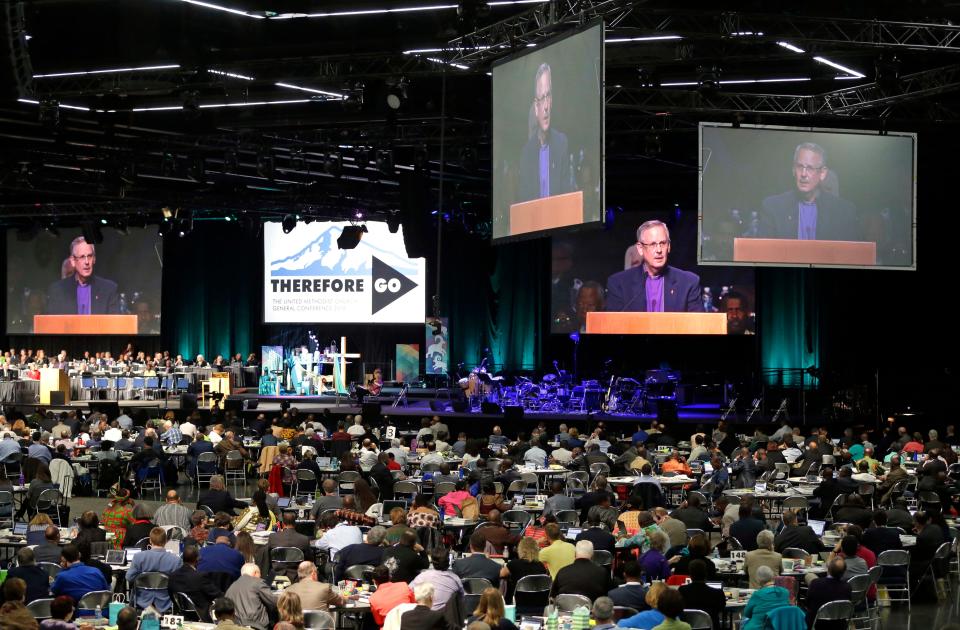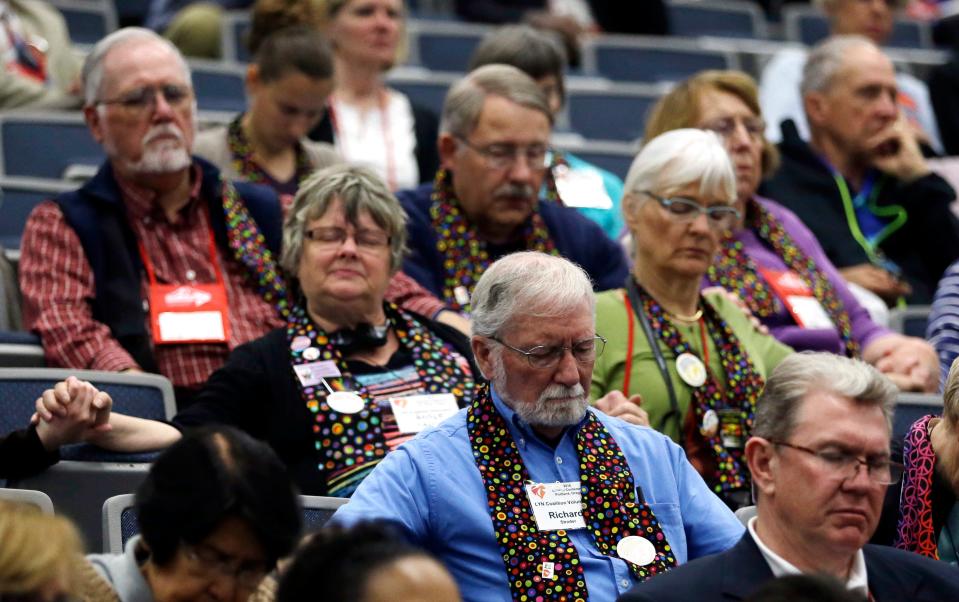United Methodists are set to hold a historic worldwide meeting: The key issues to watch
A gathering of the United Methodist Church’s top legislative body next month will be historic for the nation’s largest mainline Protestant denomination, but not in the way many originally anticipated.
The UMC General Conference, which meets every four years, is set to convene in Charlotte in April to decide which legislation will shape the long-term future of the denomination. The general conference, originally scheduled for 2020 and postponed due to the COVID-19 pandemic, follows a five-year-long exodus of mainly conservative churches.

Between 2019-2023, the largely Nashville-based United Methodist Church lost about a quarter of its total churches. It’s left the general conference with the task of refashioning the denomination’s operations and its socio-cultural values.
“With all of the changes that have happened in our midst, we find ourselves in a seminal moment in the life of this denomination,” said Bishop Thomas Bickerton, president of the UMC Council of Bishops, in a March 1 delegate orientation speech. “It’s a marker point, a shift, a pivot from what was to what can be.”
More than 7,000 churches left the denomination, or “disaffiliated,” in the past five years following disputes over theology and church policy, including dealing with LGBTQ+ rights. Many disaffiliated churches joined a more conservative breakaway denomination, the Global Methodist Church.
During the two-week event, 862 general conference delegates representing a dozen-plus countries will vote on removing anti-LGBTQ+ policies, potential major changes in the denomination’s international structure, and a drastically reduced budget.
Here’s a guide to understanding the UMC General Conference and why it will be historic.
Most recent UMC deep dive: A pro-LGBTQ movement in the United Methodist Church eyes future after conservative exodus
The process
The UMC General Conference is an amalgamation of everything from gatherings for unofficial advocacy groups to UMC general agency reports, but at the end of the day legislation is the main event.
Delegates, UMC agencies and others have submitted ahead of time 1,000-plus petitions, which are proposed legislation. During the first week of the general conference, 15 different legislative committees will sort through those petitions and decide which ones to approve and/or consolidate to send to the full general conference. The 862 delegates will then spend the second week debating and voting on those proposals.

There are different types of legislation. Chief among them are changes to the UMC Book of Discipline, which is the denomination’s compendium of policies and practices. There are also non-binding proposals to change the UMC Revised Social Principles, and to renew and add to the UMC Book of Resolutions. The latter two are more declarations of United Methodist doctrine and socio-cultural values, but can still influence book of discipline policy.
The second week of business is accessible to the public via livestream.
The issues
Amid dozens of important decisions facing the UMC General Conference, three rise to the top.
∎ LGBTQ+ rights: The fight over LGBTQ+ rights has consistently been the most contentious issue at the UMC General Conference in prior years, so much so that it set the stage for the splintering in the denomination. “No discussion of social witness legislation would be complete without mentioning LGBTQ inclusion,” said United Methodist News reporter Sam Hodges in an Feb. 29 delegate orientation presentation.
This time could be different due to the recent conservative exodus, potentially yielding success for progressive proposals to remove bans on ordination of LGBTQ+ people, prohibitions on UMC clergy or churches blessing same-sex unions, and financial penalties for United Methodist churches and other groups that “promote the acceptance of homosexuality.” Also, the same group is seeking changes to the UMC Revised Social Principles which currently says “homosexuality…(is) incompatible with Christian teaching.”
∎ Regionalization: Referring to a series of legislative proposals, regionalization would fundamentally alter the relationship between the United Methodist Church in the U.S. and in other countries. Guided by the principle of “decolonization,” regionalization would give United Methodist regional authorities in other countries more autonomy.
Progressives support regionalization because it would likely allow the American church to move in a more LGBTQ+ affirming direction, for example, while United Methodists in conservative regions such as Africa and the Philippines can maintain stricter policies. But opponents of the proposal, most of whom are conservative and now part of the Global Methodist Church, instead want the UMC General Conference to expand and extend a policy allowing disaffiliation, which expired at the end of 2023.
The regionalization proposal includes constitutional amendments, thus requiring ratification by not only the general conference but regional legislative bodies, explained United Methodist News reporter Heather Hahn in a March 1 delegation orientation presentation. As a result, if passed, the regionalization proposal wouldn’t take effect likely until 2026, Hahn said.
∎ Finances: Approving a budget will be one of the last decisions by the UMC General Conference, and the beginning of drastic changes in the months to come. The Nashville-based UMC General Council on Finance and Administration, which is the denomination’s administrative agency, is recommending a 43% decrease to the overall budget.
Since the last time the UMC General Conference approved a budget at its 2016 regular session, disaffiliations and church closures torpedoed revenue projections and now require major cuts at every level of the UMC.
“We have to be smarter about how we use our money, we have to work together more to be more effective,” said Rick King, chief financial officer for the UMC General Council on Finance and Administration, in a March 1 delegate orientation presentation.
A more immediate effect following the general conference will be when jurisdictional conferences meet later this year to decide on bishops' rosters. Most jurisdictional conferences — comprised of smaller regional U.S.-based United Methodist authorities — will likely halt new bishop appointments and expand existing bishops’ responsibilities.
Recapping wave of disaffiliations: The most consequential year in UMC split leaves uncertainty, new horizons. Here's how
The stakes
The United Methodist Church General Conference has grown accustomed in recent decades to emotionally charged debates during official business proceedings and in other moments, such as disruptive protests.
United Methodist leaders hope for different energy this year. The recent delegate orientation featured a panel on engaging in dialogue amid disagreement.

“We have a lot of legalism in our language and how we approach each other,” said panelist S. Michael Pope, a lay delegate from California and a nonprofit leader. “But if we as delegates approached each other as siblings as family that had the opportunity to build our family in a different way. In a more loving and caring way.”
Despite the conservative exodus, United Methodist News recently reported that prominent traditionalist advocacy groups still plan to attend the Charlotte conference and lobby. Those groups have previously coalesced voting power with centrists to pass or preserve anti-LGBTQ+ policies.
Bickerton said in his March 1 delegate orientation address that the tone of this general conference sets a precedent for the new era into which the UMC is entering.
“In the midst of all the passions that are emerging around this piece of legislation…I pray that we can commit ourselves to a fresh discovery of our purpose,” Bickerton said. “A new vision of ministry and a new narrative, one that clearly states and guides us into an undeniable demonstration of unity.”
Liam Adams covers religion for The Tennessean. Reach him at ladams@tennessean.com or on social media @liamsadams.
This article originally appeared on Nashville Tennessean: United Methodist Church general conference to meet in April: What to know

